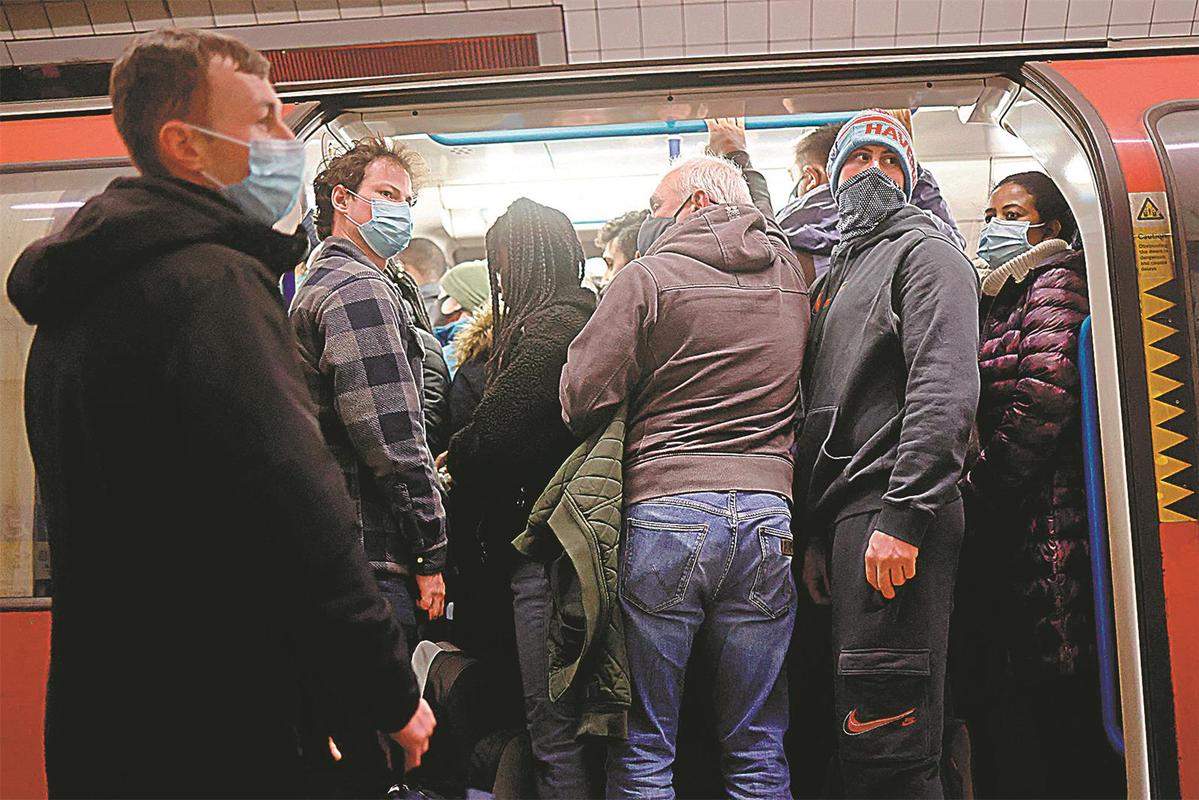COVID-19 'let loose' in nervy pandemic experiment


Political move
In justifying its strategy, the UK government said hospitalizations and COVID-19 cases are falling. There is also strong immunity in the population thanks to high vaccination rates and a surge in infections in December brought on by the Omicron variant.
Data support this claim. COVID-19 cases have fallen over the past few weeks, according to the Office of National Statistics. In the week ending Feb 12, just under 2.5 million tested positive in England, or one in 20 people, compared with 1 in 19 the previous week. Meanwhile, more than 82 percent of adults in England have received three or more vaccinations.
However, the timing of the rule change has raised eyebrows. The end to the self-isolation law was originally scheduled for late next month, but Johnson surprised many on Feb 9 when he revealed plans to bring forward the change by four weeks.
Experts asked if the expedited timeline was based on solid evidence, after it emerged that several major health authorities had not been consulted.
British epidemiologist John Edmunds told ITV News the Scientific Advisory Group for Emergencies, or SAGE, which advises the government on COVID-19 policy, had not held discussions about moving changes forward.
Welsh Economy Minister Vaughan Gething told the BBC that there was no meeting between UK chief medical officers before Johnson's surprise announcement.
Some critics say the move is designed to distract from a number of controversies that have embroiled Johnson and also to appease a faction within his Conservative Party that has long lobbied against COVID-19 restrictions.
Johnson has faced calls to stand down following revelations that several parties and gatherings were held on government properties last year, in apparent breach of lockdown rules.
Christina McAnea, general secretary of UNISON, the biggest union in the UK, said, "Ditching COVID-19 rules while the virus rages suggests public health is less important to the prime minister than saving his job."
McAnea said that rushing through rule changes means that employers could find themselves at odds with existing health and safety regulations.
"Health and care staff faced the sack if they weren't double jabbed. Soon, they will have the green light to work, even if they've got COVID-19. Putting a match to sensible safety measures without providing guidance to employers is reckless and will cause confusion and alarm," she said.
Tim Spector, lead scientist on the ZOE COVID Study at King's College London, said the decision to bring forward an end to restrictions was politically motivated, and he encouraged people to continue to isolate if possible.
"Despite the government's hasty decision to end all restrictions this month, and the message this sends, this does not mean the pandemic is over, and we should all try to be good citizens by continuing to self-isolate when ill and protect ourselves and others from what can be a really nasty infection," Spector said.
Simon Clarke, associate professor in cellular microbiology at the University of Reading, said the pandemic remains in an "uncertain period", and lifting all restrictions may prove unwise, given unknown factors over the long-term impact of infection and the risk of new variants emerging.
"It will be an experiment which will either be shown to be very brave or very stupid, but nobody knows for sure what the result will be," Clarke said.
James Gill, a clinical lecturer at Warwick Medical School, is concerned that lifting the law will encourage infected people to push themselves to return to full activities too soon, potentially prolonging their recovery.
"Frankly, I see no justifiable reason for the scrapping of this law, certainly not from the perspective of patients," Gill said.
Some within the scientific community support the government's thinking.
Irene Petersen, a professor of epidemiology and health informatics at University College London, said it has made sense to slow COVID-19 and reduce transmission to ensure most people received vaccines, but now it may be time to change strategy.
"If we want to reduce serious illness and death from COVID-19, we should seek to speed the epidemic up," Petersen said on Twitter. "If we want the epidemic to come to an end in the UK, we need to reach a level where 95 percent have immunity, either from vaccine or infection."
About 38 million people have received third, or booster, vaccines in the UK in recent months, and Petersen said this presents a sensible window to lift restrictions before booster protection begins to wane later in the year and the risk of serious illness increases.























